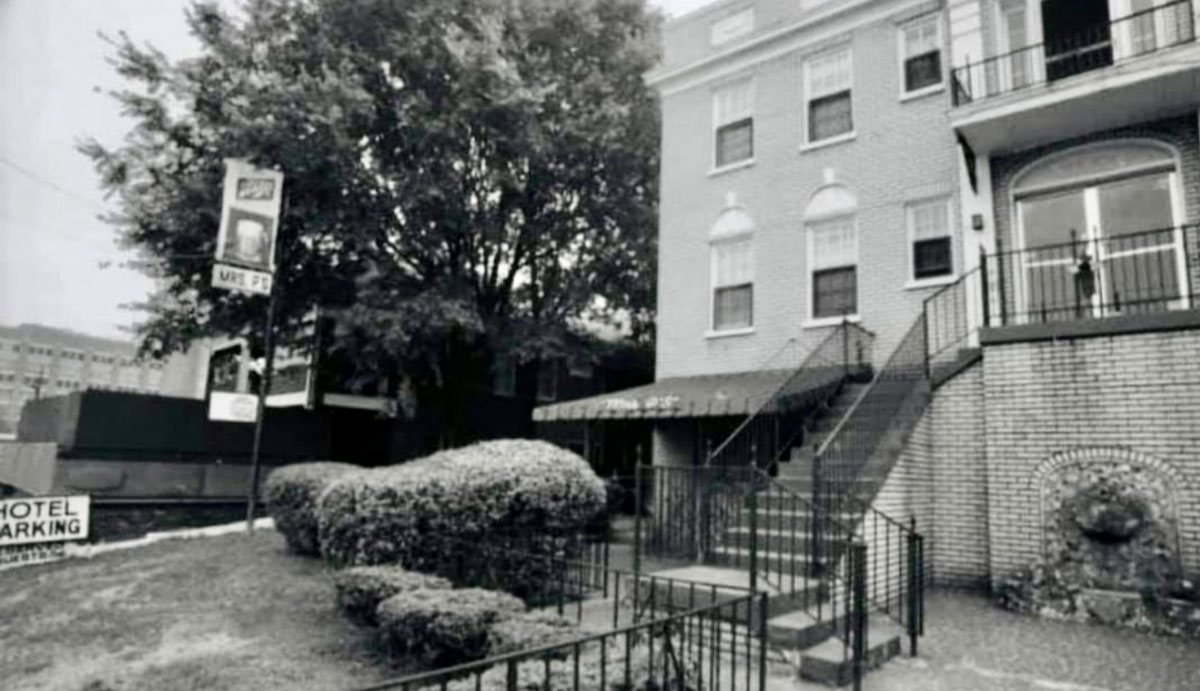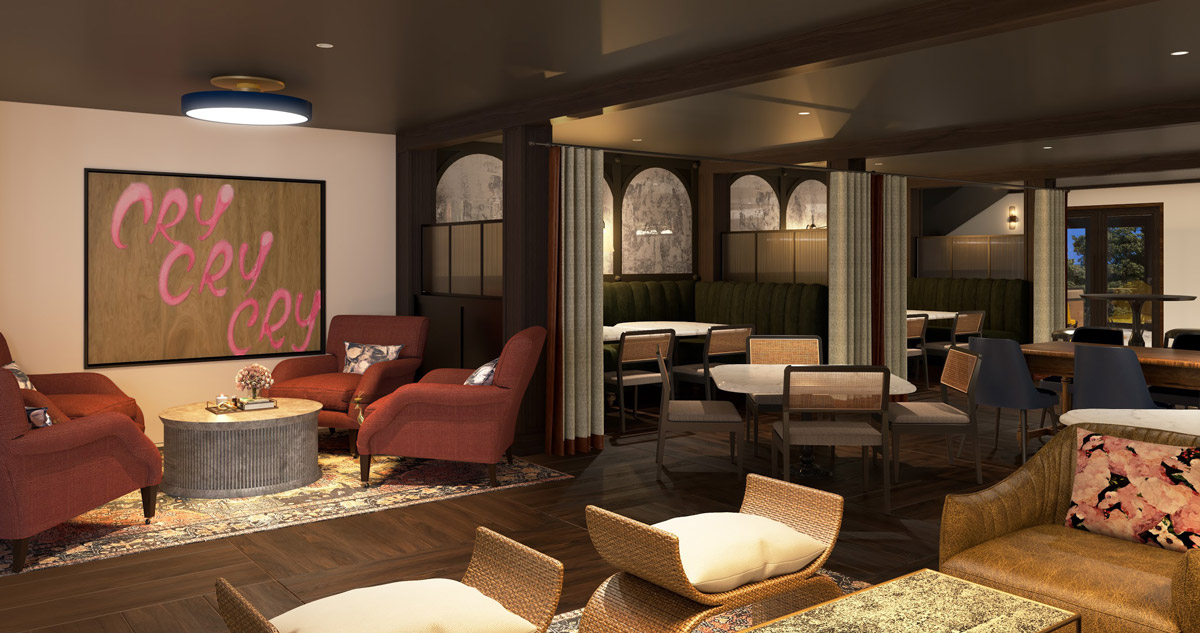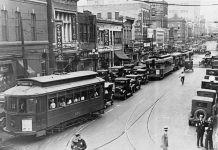
Courtesy of Georgia State University collection
In a city notorious for knocking down large swathes of its history, on a single stretch of Midtown’s Ponce de Leon Avenue, two historic LGBTQ+ spaces are being preserved.
For folks who moved to Atlanta after the Reagan administration, Mrs. P’s is the name of stylish new restaurant occupying the bottom floor of the just-opened Wylie Hotel at 551 Ponce de Leon Avenue. But for an older generation of queer Atlantans, Mrs. P’s was one of the city’s first safe spaces for LGBTQ+ residents, from the time it was opened as a restaurant by Vera Phillips in 1956 until a final police raid in the early 1980s.

Photograph by Rich Eldredge
Meanwhile, down the street at 306 Ponce de Leon Avenue, thanks to an initiative from preservation nonprofit Historic Atlanta, the city’s Zoning Review Board approved an ordinance this spring making the Atlanta Eagle the city’s first designated historic landmark dedicated to LGBTQ+ history. In the space’s brief mid-1980s incarnation as the Celebrity Club, it hosted shows featuring a young RuPaul. Perhaps, more notoriously, during its run as the Atlanta Eagle—a gay leather bar from 1987 to 2020—the nightspot made headlines for a botched 2009 police raid, where members of the vice squad, looking for illegal drug use and acts of public sex, yelled anti-gay slurs and handcuffed patrons and employees face down on the bar floor. In the years following, aftera federal lawsuit alleging civil rights violations and a $1 million-plus settlement, the disbanding of the Atlanta Police Department’s Red Dog unit, and multiple officer firings, the APD has sought to repair relationships with the city’s LGBTQ+ community, including the hiring of a LGBTQ+ community liaison.
In the ever-shifting commercial real estate realities of Atlanta’s rainbow crosswalk-adorned, LGBTQ-friendly Midtown, the preservation and restoration of Mrs. P’s and the Eagle are significant, especially as two iconic gay-friendly businesses serve up last call—Einstein’s on Juniper Street shuttered after 30 years on June 1 with its sister restaurant, Joe’s on Juniper, set to follow later this year.
While he helped to initiate the saving of the Atlanta Eagle’s address, Charlie Paine, who grew up in Atlanta’s Druid Hills neighborhood and serves as the LGBTQ Historic Preservation Advisory Committee chair at Historic Atlanta, is also excited to see the resurrection of Mrs. P’s. “It’s really humbling to see LGBTQ history being recognized in a new development like this,” says Paine. “Without being forced to in any way whatsoever, the new owners and developers of the Wylie Hotel opted to embrace that history.”
“It’s really exciting to see an homage paid to Mrs. P’s since it served as a pretty important establishment, in terms of an early decidedly LGBTQ space,” Paine continued. “For some time before then, drag shows were often held at 5 o’clock happy hour at straight venues. Mrs. P’s became one of those transitional spaces that became more decidedly serving of the LGBTQ community.”
After a brief stint as the first home for after-hours night spot MJQ from 1994 to 1997, the fortunes of the former gay bar in the basement of the dilapidated Ponce de Leon Hotel floundered, until it eventually became a boarded-up eyesore on Ponce. The structure with its trademark graffitied “Cry, Cry, Cry” spray-painted in red on two sides of the building stood vacant until it was bought by Kim King Associates in 2019 and transformed into a 111-room boutique hotel by Mainsail Lodging & Development.
After a pandemic-related delay, the Wylie Hotel, across the way from Ponce City Market, finally opened for guests in May with Mrs. P’s debuting in June.

Rendering courtesy of the Wylie Hotel
For the family-run real estate company started by legendary Georgia Tech quarterback Kim King in 1972 (King’s Tech #18 is slyly referenced in an antique Ponce de Leon Hotel Room No. 18 key framed on the wall in an upstairs suite), dusting off the Mrs. P’s name was an easy call.
“Being from this city, we recognize that Atlanta is always at risk of losing so much of its identity,” says Abby King, Kim King Associates President. “Given its history, it was important for us to preserve this space, along with the name.”
King, who used to drive past the space as a high schooler back when it was MJQ, is especially cognizant of what it means to preserve one of the city’s remaining LGBTQ+ spaces in 2021, when Atlanta marks the 50th anniversary the city’s first Pride march—a gay rights protest originally attended by participants sporting brown paper bags over their heads since many feared being fired for their sexual orientation. “Those people are heroes,” says King. “They risked their jobs, their housing, and their families in order to be who they are. It’s important to honor them.”

Rendering courtesy of the Wylie Hotel
While he just missed the heyday of the original Mrs. P’s when he moved to Atlanta in 1983, Clay Miller, now an administrator of the 1,761-member You’ve Lived in Gay Atlanta a Long Time If You Remember… Facebook group, vividly recalls a factoid he came across in a book about that period in the city’s history. “Men who visited Mrs. P’s parked blocks away and carried their umbrellas,” he says. “When they got within a block of the bar, they would open their umbrellas and face them towards Ponce, shielding their identity from the cars driving by.”
When it originally opened in 1956, the Mrs. P’s operated by namesake Vera Phillips, attracted an after-work crowd of mostly women who worked nearby at the massive Sears and Roebuck building, now Ponce City Market. But by the 1960s and 1970s, the space had been largely taken over by gay men and transformed into a leather-and-Levi’s bar that featured some of the city’s first drag shows. (The Mrs. P’s annex, built in the adjacent parking lot, was later opened to accommodate more room for the drag performers and their fans).
Longtime residents who are members of the You’ve Lived in Gay Atlanta a Long Time If You Remember… group recently reflected on their nights sipping 25-cent drafts inside the small basement bar with the black painted walls, where trysts occasionally occurred in the darkened corners and iconic drag performers such as Atlanta’s Diamond Lil were regulars. Former Mrs. P’s regular Jim Knoll recalled a particularly memorable reunion with a childhood friend shortly after he relocated to Atlanta from Cincinnati.
“I went to Mrs. P’s for dinner,” he says. “Fried chicken and sides. My friends tried to get seated for last dinner service because once dinner was finished, the restaurant turned into a drag bar. On the way to the men’s room, a spangled woman rushed up to me, saying, ‘I know you! Don’t you remember me?’ I nervously replied, ‘No, ma’am. I’m new here.’ She answered, ‘I know that, honey. You went to Holy Family grade school in Cincinnati with me. I’m Errol!’”
Charles Chambers was in his 20s when he landed a bartending job at Mrs. P’s in the late 1970s. He recalls how Mrs. P’s skillfully navigated the city’s strict ordinances and dress codes, many put in place to target gay bars and the drag performers who frequented the establishments.
“In the ’70’s, gay bars required patrons to wear neckties after 6 p.m., so the bar had a ton of ties available for customers to put around their necks,” he explains. “Bars had to close at 11:55 p.m. on Saturday nights, too. It basically meant no drinks could be sold after that time. What Mrs. P’s did was sell tickets for drinks before midnight. Different colors for what drink or beer you wanted. The money was then pulled off the bar, and no money changed hands after midnight. It drove the cops crazy.”
Chambers also recalls his surprise birthday party thrown by friends at their house that took him away from the Mrs. P’s bar one fateful evening. “That night, the police raided the bar and made multiple arrests,” says Chambers. “If I had been working, I would have gone to jail. The police—what can I say? They were always around. It was a great but sometimes scary time in Atlanta.”
The police raids happened so frequently, former Mrs. P’s regular Cliff Bostock remembers that customers developed a whimsical response to the waiting paddy wagons outside: a flashing red light bulb inside the bar alerted patrons to the arriving cops. Says Bostock: “I remember one evening, a bunch of guys were lined up and led out the door by the cops, and the guys turned it into a conga line.”
Diamond Lil was arrested so frequently she turned the experience into her song, Jailhouse Jezebel, complete with the sounds of police sirens and clanging jailhouse doors: In between my fingerprints and mugshots, I wrote me a song. I’m a Jailhouse Jezebel. I was born to raise some hell. I want to get back on the street as fast as I can. I’m a Jailhouse Jezebel.
Wylie Hotel Director of Sales Liz Young says the new incarnation of Mrs. P’s Bar & Kitchen plans to honor the spirit of the space’s history by hosting the occasional Sunday Drag Brunch featuring the city’s current generation of drag performers—with Diamond Lil spinning on the hotel Victrola record player.

Photograph by Rich Eldredge
Down the street, the future of Atlanta Eagle remains less certain. While now a designated landmark, the building is desperately in need of major repairs and renovation. Last fall, as the pandemic raged, the Atlanta Eagle served up what it thought was its last call in the space. As the owners decide what happens next, they’re keeping customers aware of Eagle-sponsored events at bars around the city via their Facebook page.
While the Atlanta Eagle’s exteriors have seen better days, Historic Atlanta’s Paine argues that aesthetics are only a part of the space’s historic story. We didn’t make [New York’s] Stonewall a national historic landmark because of what it looks like,” says Paine. “We preserve places for two reasons: aesthetic value and historic value. It’s important for us to be proactive in preserving the LGBTQ spaces we have left in the city of Atlanta. As the city continues to grow, it’s going to become more difficult to preserve the city’s gay identity if we don’t think about it upfront.”













